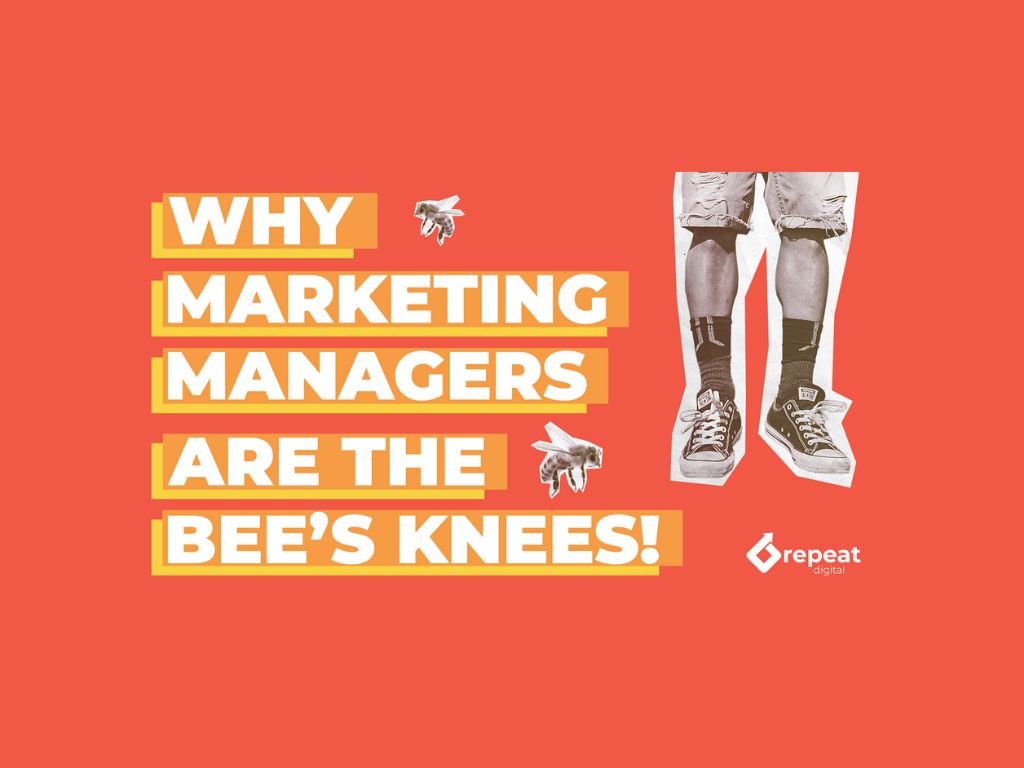
We may have Grammarly, AI and various spell checkers at our disposal, but that doesn’t stop the occassional mispelling (see what we did there?) from slipping past the radar and making it into our copy.
While these pesky-to-spell words aren’t the same for everyone, there are words that seem to trip people up more than others.
We set about discovering the most common spelling mistakes among Brits, taking a deeper dive into the cities most prone to these typos, and identifying the top errors in each city.
The Biggest Misspelling May Not Be What You Expect
To reveal the most common misspellings, we first gathered a variety of resources with their own take on the topic. Using a word frequency counter, we were able to create a definitive list of the top 25 spelling mistakes, before putting them into the correct order using search volume data from the past 12 months.
Would you be surprised to learn that the most common error is actually writing calendar with an ‘e’ instead of an ‘a’ (misspelling: calender)?
This word generates around 5.5 million searches in the UK each year, with those in London, Edinburgh and Bristol most likely to make this blunder (looking at data per 100,000 people). Calendar is also the number one misspelt word in each of the top 20 populated cities we assessed for this research.
Here are the top 25 words and their associated search volumes:
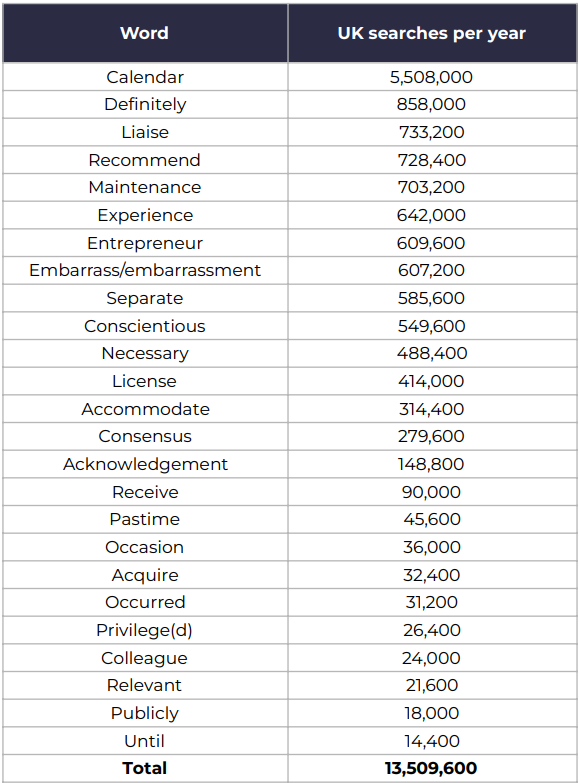
Which Cities Struggle With Spelling The Most?
Those living in London, Edinburgh and Bristol don’t just struggle with the spelling of ‘calendar’; they’re also most likely to misspell any of the 25 words listed above. In London, for example, there are 28,765 searches per year for at least one of the most common misspellings, per 100,000 people.
When looking at search volume per city, we took into account search queries for eight different terms including ‘how do you spell…’, ‘how to spell…’, and ‘correct spelling of…’.
Londoners frequently came out on top for their inability, more than any other city, to spell the following words:
- Calendar
- Definitely
- Liaise
- Recommend
- Maintenance
- Experience
- Entrepreneur
- Separate
- Necessary
- License
- Accommodate
- Receive
Meanwhile, Edinburgh residents are most likely to make an error with ‘embarrass’, ‘consensus’, ‘acknowledgement’, and ‘colleague’.
Coventry tops the list for four other misspellings – ‘occurred’, ‘relevant’, ‘publicly’, and ‘until’, whereas Bristolians struggle with ‘pastime’ – adding an extra ‘t’ into the mix – and ‘acquire’, missing out the ‘c’.
London
When collecting the data for the UK and individual cities, we used the following search queries:
<Incorrect word>
<Incorrect word> spelling
<Incorrect word> vs <correct word>
<Incorrect word> or <correct work>
How do you spell <incorrect word>?
How to spell <incorrect word>
Correct spelling of <incorrect word>
Is <incorrect word> correct?
We looked at both the number of total searches per word, and also the total number of searches ‘per capita’ (per 100,000 people in this case).
In the capital, there are more than 2.7 million searches made for at least one of the most common misspelt words per year – equating to 20% of all UK searches.
Taking the findings on a per capita basis, ‘calendar’, ‘liaise’ and ‘definitely’ are London’s most regular typos. This is also the same for Manchester, Leeds, Southampton, Newcastle, and Bournemouth.
Here is the full top ten for London:
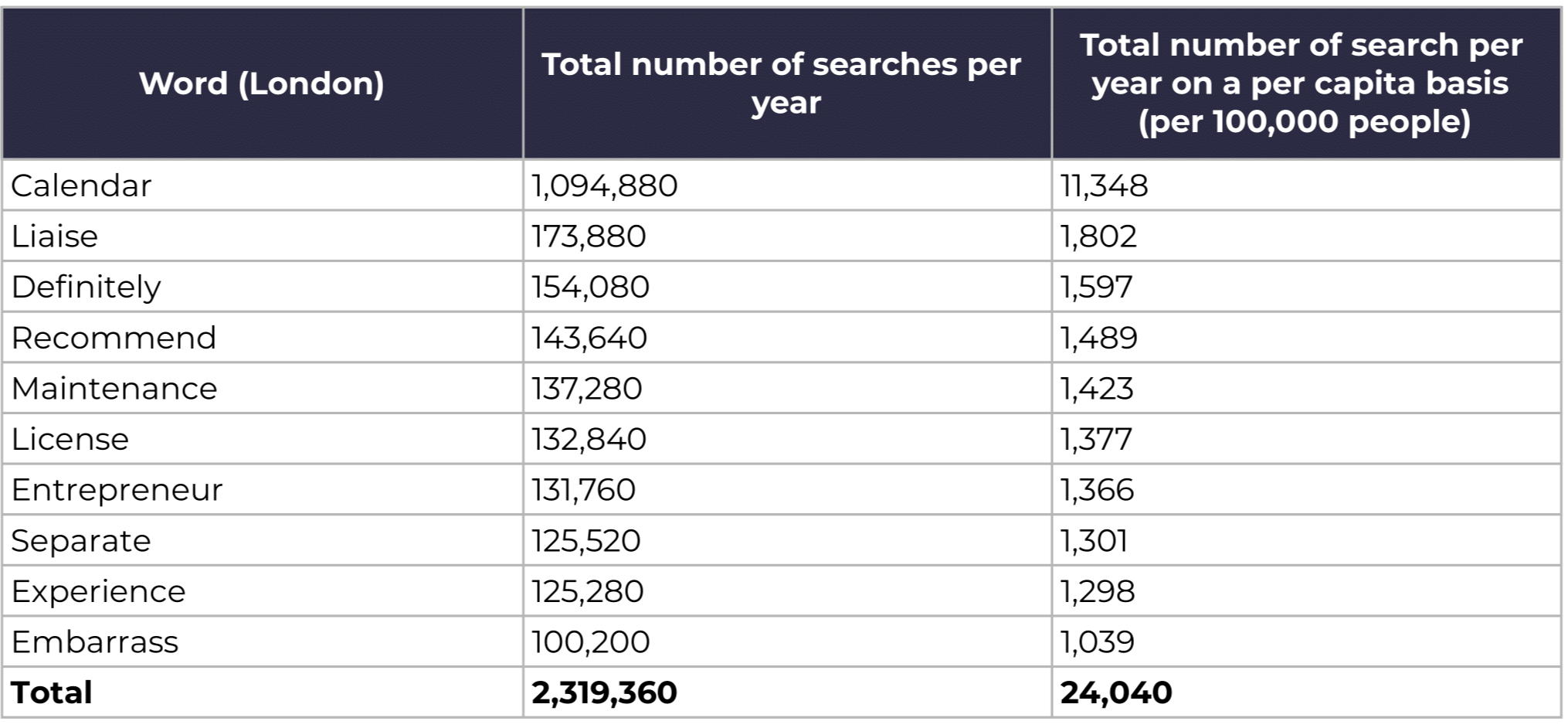
Edinburgh
In the Scottish capital of Edinburgh, there are 143,400 searches made for these words per year. Looking at it per capita, Edinburgh is in the top three cities for the most misspellings of 24 out of the 25 words (all except ‘until’).
Edinburgh residents struggle with the same spellings as Londoners, but ‘definitely’ is in second position. ‘Liaise’ is in third.
Here is the full top ten for Edinburgh:
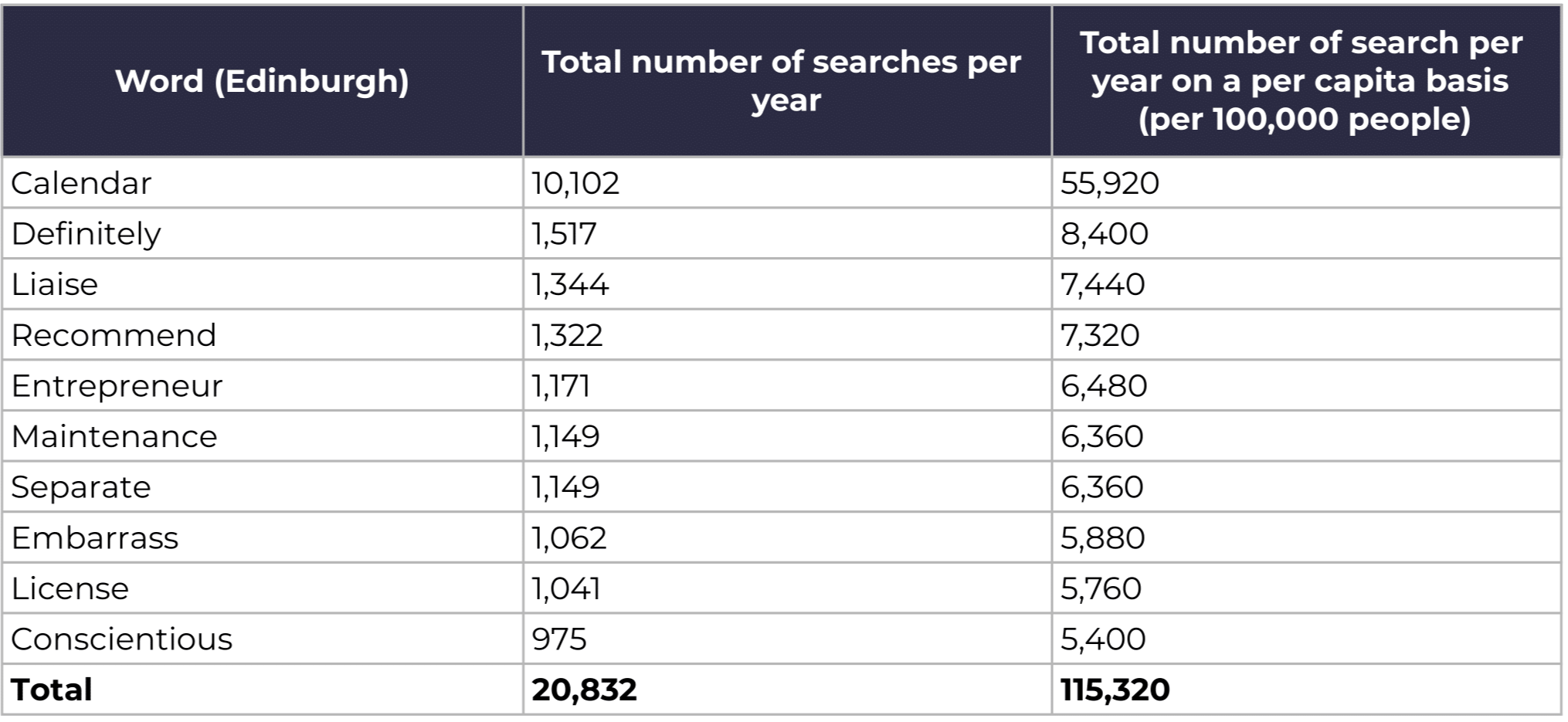
Bristol
Bristol is in the top three cities for the most misspellings of 17 out of the 25 words. Bristolians tend to get confused over how to write ‘calendar’, ‘definitely’, ‘liaise’, and ‘recommend’ (with ‘definitely’ and ‘liaise’ in joint second place).
Here is the full top ten for Bristol:
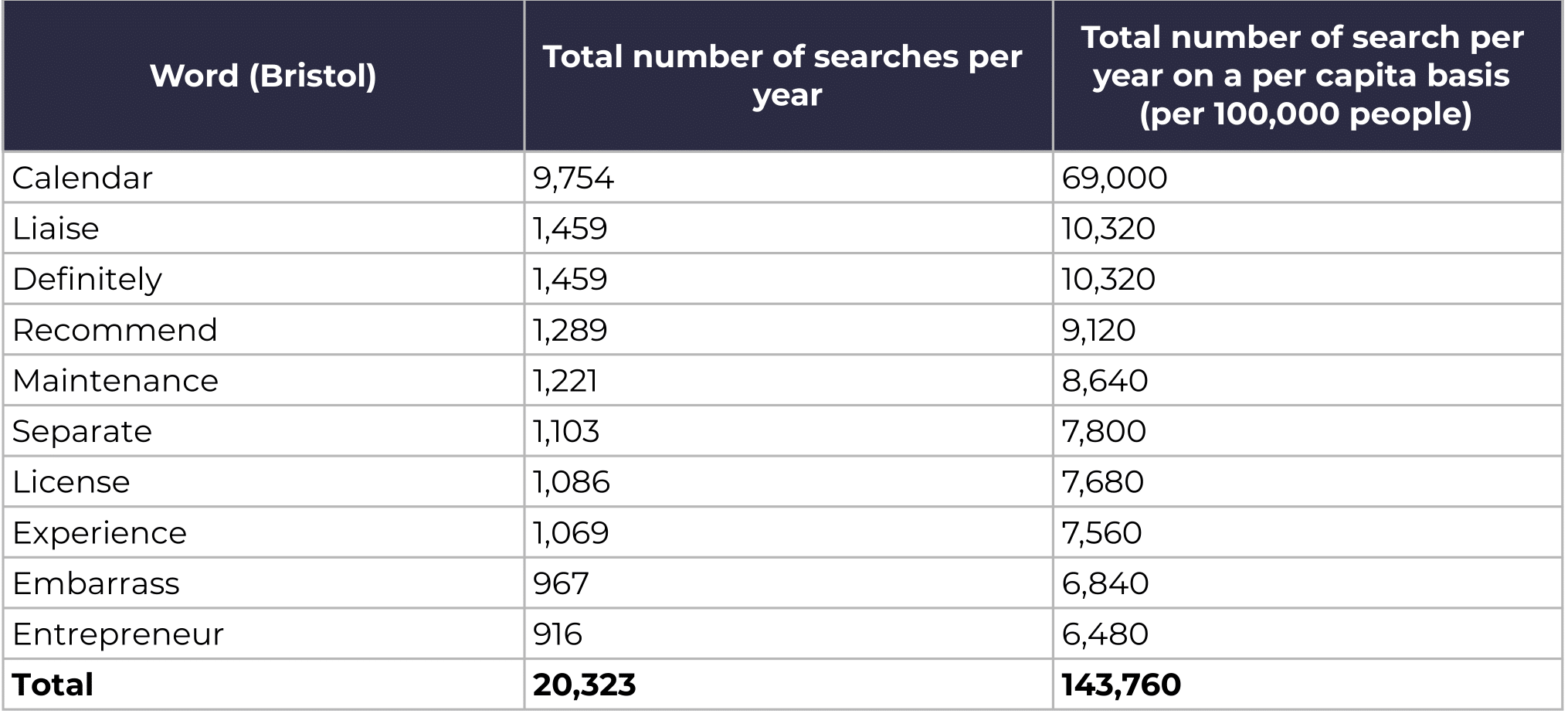
Why Are There Certain Words More Difficult to Spell?
Trevor Conway, Irish poet and proofreader of business and academic text, says some words on the list surprise him:
“For example, ‘receive’. Didn’t everybody learn the rule “I before E except after C” before they stopped believing in Santa Claus? Apparently not. Other words in the list are to be expected. ‘Liaise’ is a tricky one. The same applies to words with double letters, such as ‘recommend’, ‘accommodate’ and ‘embarrass’. I think many people are aware that double letters are needed somewhere in these words, but they’re not sure where. Thus, many people write ‘reccomend’, ‘acommodate’ or ‘embarass’, believing no word has two sets of double letters. I’d love to see how they try to spell ‘Mississippi’.”
Trevor explains the usual reason for mistakes is the belief that words should be spelled phonetically.
“It certainly is the case that words which are not spelled phonetically are more difficult to spell, but sometimes, other associations come into play. One common misspelling I come across in my work as a proofreader and editor is ‘lead’ (rhyming with ‘head’) when referring to the past tense of the verb to lead (i.e., ‘led’). In this case, there are two associations at play: the first is that the past tense of the verb to read is spelled ‘read’, just like the present tense form. The second association here is the spelling of the substance we find in pencils, ‘lead’, which sounds identical to ‘led’.”
Jobseekers Beware: Double-check Your CV Before Hitting Send
Words make the world go round – we use them for everything. Whether we’re writing an email, drafting an essay, or submitting a job application, the words we choose have a direct impact on how we express ideas, convey meaning, and connect with others.
More than six in ten (61%) hiring managers would automatically dismiss a candidate if they spot a typo, which makes spelling mistakes the number one reason for instant rejections.
Adzuna, a search engine for job advertisements, analysed more than 267,000 UK CVs uploaded to ValueMyCV in March 2023 to highlight the most common errors made in each job application. It found that nearly nine in ten jobseekers make at least one avoidable mistake in their CVs, and 37% are making five errors or more.
Using American English was revealed as a common pitfall, with words such as ‘organisation’, ‘analyse’, ‘optimise’, ‘centre’, and ‘utilising’ containing a ‘z’ instead of an ‘s’.
In Adzuna’s research, Londoners were also found to be making the most mistakes!
James Calder, CEO of recruitment company Distinct, comments: “For some hiring managers, spelling mistakes are a red flag that can lead to automatic rejections. We commonly see ‘conscientious’ and ‘privilege’ misspelt, which can be particularly detrimental in a competitive application landscape, where they serve as an easy way to narrow down candidates. While our brains can sometimes overlook typos, a CV or cover letter filled with mistakes signals a lack of attention to detail – often essential in professional roles. Beyond simple errors, poor formatting and vague language can significantly undermine a CV’s impact.
“My advice is to go beyond relying on online spell checkers. Take the time to read your documents aloud and seek feedback from trusted peers. Most importantly, reflect on what you’re communicating in each section. A cover letter and CV are your opportunities to demonstrate why you’re the right fit for the role, so make the most of them. While it’s essential for employers to uphold high standards, I believe a single spelling mistake shouldn’t disqualify a candidate, especially when their skills and experience align well with the position.”
Misspellings Present an Opportunity in Marketing
Search Engine Optimisation (SEO)
When it comes to SEO, targeting misspelt keywords can be a valuable, often overlooked strategy. People frequently make spelling mistakes in search queries, and this presents a unique opportunity to capture traffic that might be missed. Misspelt keywords tend to have lower competition, and including them in organic content can lead to incremental traffic gains. For instance, the misspelling ‘calender’ (instead of ‘calendar’) generates millions of searches each year in the UK. By targeting common misspellings, you can attract users who might otherwise land on a competitor’s site.
If you want to make the most of this strategy, start by using keyword research tools like Google Keyword Planner or SEMrush to uncover the most frequent misspellings related to your industry. While it’s important to keep your SEO copywriting polished, you can sneak these misspelt words into meta descriptions, alt text, or even image file names without affecting the professionalism of your site. You can also mention these common mistakes in blog posts or FAQs in a way that feels natural, like comparing ‘calendar’ to ‘calender’ or ‘definitely’ to ‘definately’. Make sure to monitor your results by tracking traffic from these misspelt terms using SEO tools like Semrush or SE Ranking.
Taking advantage of common misspellings offers a subtle yet effective way to capture search traffic. It’s a simple tactic that can help engage users who, despite spelling errors, are still searching for what you offer.
Pay-Per-Click (PPC)
Generally in Google Ads when you are targeting keywords, misspelt variations are included in targeting as spelling errors are regarded as close variants within match types, for example:
- Phrase match (close variant)
- Exact match (close variant)

The real-life example above shows the keyword being bid on is [hot tubs] on exact match. The search term that triggers the ads is ‘hot tubes’ due to being a ‘close variant’.
It is possible to add spelling variations of keywords as exact match however there would be some challenges and we would suggest not including misspelt keywords:
- Decreased search volume – misspelt keywords generally would have lower search volumes compared to the correct spelling
- Less relevance – Due to the lower search volume and possible unrelated search results that would appear for misspelt keywords for example an online store that sells footwear could target the misspelt keyword “shose” instead of “shoes” which means ads would appear for search queries such as “hose” or “close” which reduces the relevance of the ads as well as increases the number of wasted clicks. The Quality Score would reduce significantly as a result of lower search volumes and ad relevance and impact Google’s algorithm resulting in higher Avg CPCs and slower performance.
- Wasted Spend – Due to the higher Avg CPCs and budget going towards these misspelt keywords with a less likely chance of generating conversions there would be wasted spend.
Methodology
Repeat Digital gathered eight online resources to discover which misspellings are a common occurrence. A word frequency counter was then used to discover a definitive list of the UK’s top 25 most common misspellings.
To make the list up-to-date, we used Mangools SEO tool to discover the monthly search volumes for each individual word, both for the UK as a whole, and for the top 20 most populated cities. Each figure was multiplied by 12 to give an accurate representation of searches made over the past 12 months.
As London is by far the most populated city, we used a ‘per capita’ formula to stop London from skewing the data. We made the research as proportionate as possible by looking at the number of searches made per 100,000 people.
Data for this research was collected between September 16 and September 19 2024.
Jump into another related resource
Whether you’re after expert-written blogs, downloadable guides, or time-saving checklists, our Resource Hub gives you practical tools to make your marketing more effective.



